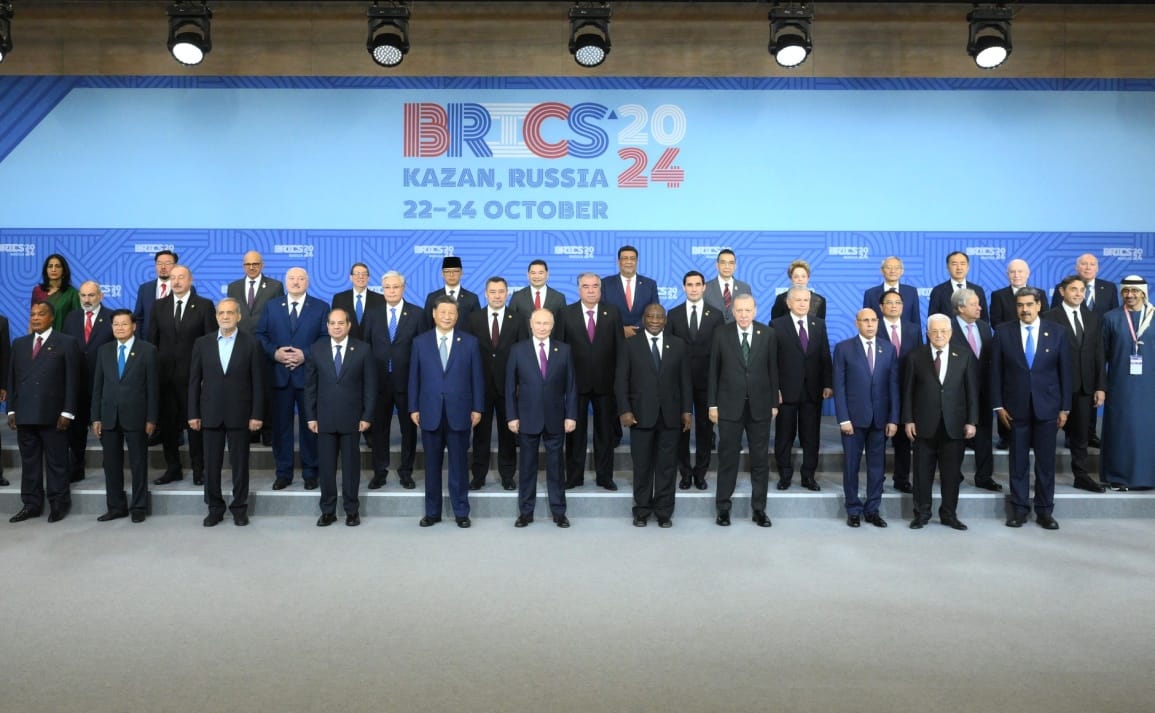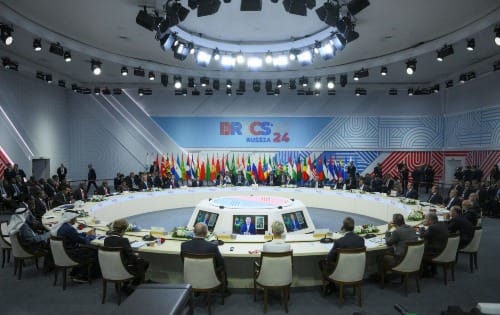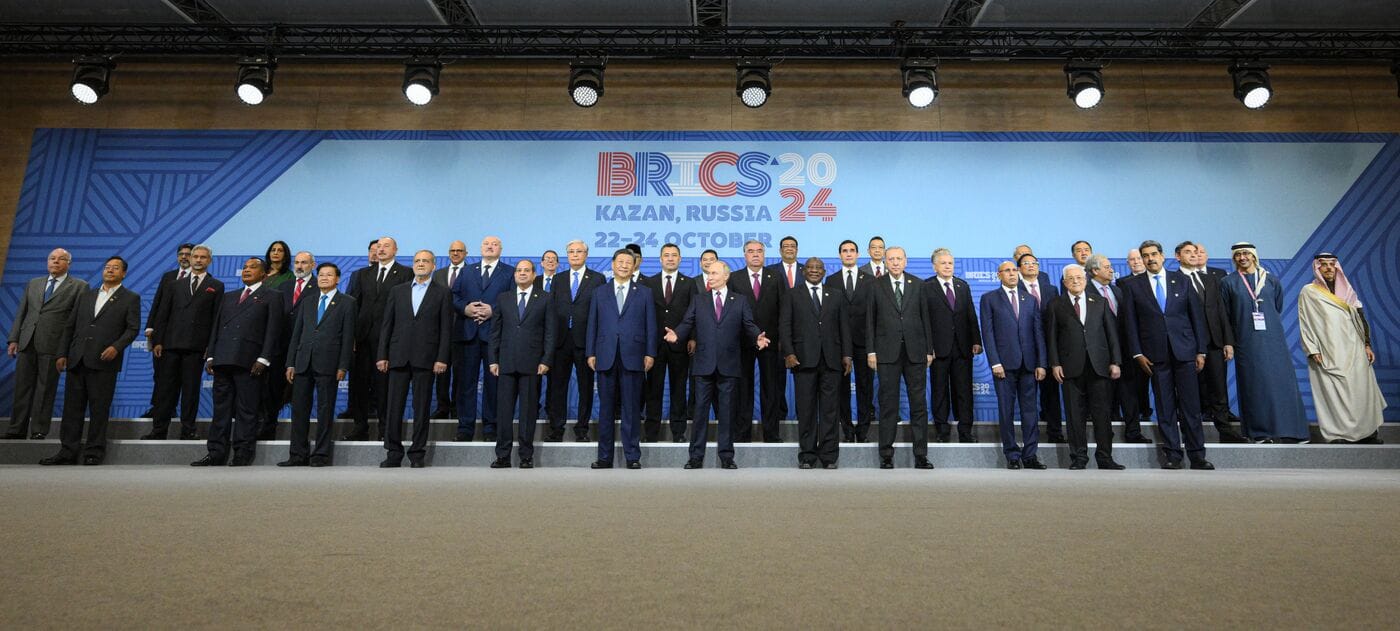BRICS: Echoes of an Emerging Global Order

Share
The international spotlight was swept away this week by the BRICS+ Summit in Kazan, Russia. Held under the theme of “Strengthening Multilateralism For Just Global Development And Security”, it sported the attendance of 24 heads of state or government (Brazil’s Lula attended virtually due to health concerns). It also saw broad ministerial representation, as well as the attendance of the Secretary General of the United Nations.
Coverage and analysis of the conference has made much of the summit’s focus on providing alternative financial systems that would reduce reliance on the dollar and existing international financial organizations led by the US and the west, but there is more to it than that.
The Kazan Summit had a broader scope than just financial alternatives. For Russia, it was an opportunity to flex its diplomatic clout, showcasing the strength of its global relations and the ineffectual attempts by the US and Europe to isolate it. For many of the participants, representing a broad swath of developing countries, it presented an alternative platform to the existing global forums where they are either underrepresented or unheard.
The broad participation at the level of heads of state and government sends a message that this is a forum given considerable political weight by its members and aspiring members. It also reflects growing frustration with the current international architecture, including the UN, which states of the Global South have been vocal about reforming to reflect current political realities rather than those of the mid twentieth century.
Whether or not BRICS will become a real, viable, effective alternative platform for international engagement will be determined by the extent of engagement of its members with the proposals advanced in this summit.
Outcomes of the Summit: The Kazan Declaration

This Summit was the first to be held with the participation of the four new members that joined in January of this year, Egypt, Ethiopia, Iran, and the United Arab Emirates, bringing the membership to nine. It also featured a broader format meeting, BRICS Global Outreach, that included discussions with aspiring members and invited guests.
The outcomes of the Summit were encapsulated in the Kazan Declaration, a detailed document that reflects the broadening scope of interests of the emerging bloc. Under the thematic heading of “Strengthening Multilateralism For Just Global Development And Security”, the declaration covered cooperation on multiple fronts, including economic and financial topics, engagement on security and stability, development, climate collaboration, and social and cultural cooperation.
Through this declaration, member states expressed their intent to effect change in the global multilateral system, stating that it no longer reflects the realities on the ground and remains rooted in a post second world war foundation. On this topic the declaration tackled reform within the UN, the World Trade Organization (WTO), the World Bank, and the International Monetary Fund (IMF).
It also addressed global security issues, with a particular focus on the Israeli war on Palestine and Lebanon, condemning the double standards exhibited by global actors in upholding international human rights law and international humanitarian law. Elaborating on this issue, it condemned the repeated Israeli violations of international law, and described the pager attacks in Lebanon as an act of terrorism.
The declaration further touched on the ongoing war in Sudan and the increased violence in Haiti, with one mild reference to Ukraine (that simply took note that there were national positions in its regard). It also addressed the various global security concerns like the nuclear weapons free Middle East, the Iran nuclear deal, and Africa’s security challenges including terrorism.
In touching on the topic of human rights, the declaration focused on depoliticizing, and the importance of development as a human right. It also specifically mentioned the necessity of safeguarding the rights of girls and women in Afghanistan, deliberately excluding any reference to the initiative led by Germany, Canada, Australia and the Netherlands on that topic in September.
From there, the declaration dove into the topic that received the lion’s share of media coverage: enhancing financial cooperation and economic engagement through local currencies and reducing reliance on the dollar. While there was no specific mention of the dollar in the declaration, the emphasis was on supporting the New Development Bank (NDB) and trade in local currencies. In this regard it emphasized the need for enhancing banking cooperation and networks and implementing the BRICS Cross-Border Payments Initiative.
These elements all feed into the same direction: establishing the foundation of an international financial system independent of existing financial structures that are not, per the members of BRICS, adequately representative or considerate of the needs of developing countries.
Member states also voiced their intent to engage in cooperation in the fields of energy, medicine, mineral resources, transport, justice, taxation and customs.
On the topic of broadening membership, member states adopted a mechanism of “Partner Country” status, as a step to accession to the group for aspiring members, which 13 countries were granted during the Summit, indicating an inclination toward accelerating expansion of the bloc.
Takeaways

The Declaration itself follows the format of previous outcome documents, like the Johannesburg II Declaration or the Beijing Declaration. It stands out with its greater emphasis on specificity of mechanisms of engagement that may be the promise of a more structured cooperation framework.
BRICS today does not have a secretariat, a charter, or permanent headquarters. It is organized by engagement between special representatives appointed by member states -sherpas- and decisions are made through consultation. None of the declarations are binding on its members, and participation remains entirely voluntary. The only structured entity associated with BRICS at the moment is the NDB, and it has recently formalized business engagement through the BRICS Business council, BRICS Think Tanks Council, and the BRICS Women’s Business Alliance.
However, the declaration reveals early steps toward a more structured BRICS framework, moving beyond its current informal setup: it includes references to various working groups, mechanisms, initiatives, platforms, and associations that may need to evolve into structured formats to enable functionality and the achievement of targets. These span the fields of security, corruption, education, customs, energy, finance, industry, technology, R&D, and the exchange of information.
The summit also sends a strong message to current global powers; whether BRICS itself becomes the fulcrum of an emerging global order, the extent of frustration with the existing order is spurring a search for alternatives. Even if BRICS were to remain ineffectual in addressing these concerns, the political motivation for change has reached a tipping point that will drive the search for mechanisms beyond US and Western led structures in place today.
The attendance of a significant number of heads of government -many of whom from allies of the US- also sends a message that these countries are not as bound by their partnerships to the US as they had been previously. Their positive engagement with Russia despite the sanctions regime imposed by western governments is a strong indicator of dissatisfaction with their interests not being taken on board in international decision making. It also reflects a growing concern that under the current financial framework, any one of the countries is liable to fall victim to a similar sanctions regime imposed unilaterally through the near monopolized global banking system.
BRICS also provides an important alternative not only to the existing global architecture embodied in the UN, but also to existing mechanisms of cooperation that are more regional or geographic in nature. By its nature, it is transcontinental, not restricting membership based on geography like in other blocs like the African Union or ASEAN.
It is however exclusionary in one specific sense that seeks to preserve it against western influences present in other transcontinental groupings like the G20, in that one of the criteria for membership is that the applicant state be “be an emerging or developing country”. In having that provision, it limits the potential for broad membership from the Global North, which on the one hand reduces the influence from the US and Europe, while at the same time favors Russian and Chinese influence on the direction of the bloc.
With four new members joining BRICS this year, and with many more knocking on the door, the bloc is gaining momentum, and with every added member it grows in influence and impact. With a broader economic foundation, the attraction points of joining an economic group that hedges against the risks of over relying on the existing global financial architecture increase considerably.
Future Trends
With nine members, one invited member, and thirteen partner countries, the projected growth of BRICS’s economic significance over the next year is considerable. It has already overtaken the G7 in terms of percentage of global GDP at 35% compared to the G7’s 30%.
At the moment, the modus operandi of the bloc is manageable in its current form, however with growing membership applications with its broadening scope of engagement on multiple issues ranging from security to economic cooperation, BRICS may have to reimagine its structure. The Kazan Declaration did include a reference to promoting BRICS institutional development, which may pave the way for formalizing the structures of the loose coalition.
The potential implementation of trade in local currencies that do not rely on the US dollar as the currency of exchange would grant a greater level of economic independence, to member states, hedging risks associated with dependence on the current financial system; the risk of being targeted with economic sanctions based on political positions is one that hovers at the forefront of many developing countries, particularly those reliant on development aid.
The initiative by BRICS to adopt the partner country mechanism is also significant. It allows prospective members who may not want to be regarded as anti-western an opportunity to engage with the bloc without committing to membership, while at the same time providing a sort of preview of the benefits of membership. Another indicator of BRICS’s motivation for growth comes from the NDB welcoming membership applications from “all members of the United Nations”, allowing countries to associate financially without committing politically to BRICS membership.
With its current growth direction, BRICS would include significant representation from other blocs within its own roster, with the African Union, ASEAN, Organization of Turkic States, and the Commonwealth of Independent States, among others, being broadly represented. If it continues along this path, possibly with growing membership from Mercosur (Argentina withdrew its application after the election of Milei in November 2023, but may reapply in the future, and Venezuela’s application was stopped by Brazil due to political disagreements), it could become a powerful focal point for the Global South, and accordingly wield significant influence in Global forums.
Impact

With the success of this summit, the wide participation at the level of heads of government, accession of new members, the addition of partner countries, and the applications of several others to join, BRICS’s growing momentum is difficult to refute. Add to that the increasing role of the NDB and its attempts to position itself as a viable alternative to existing mechanisms, and you have a formula for potential disruption of the current state of affairs.
The US and Europe are taking note of the growing influence of the bloc, particularly as it pertains to the expanding influence of both China and Russia across the global stage. On the economic front, it presents a challenge to a system where they wield considerable influence, whether through the reliance of the banking system on the US dollar or through their prominent roles in global financial institutions like the World Bank and the IMF.
On the political front, it reflects a shift in the power dynamics on the global stage. The participation of a large number of heads of state not only of member countries but of aspiring countries, among them NATO member Türkiye, represents a defiance of US and European efforts over the course of the past three years to isolate Russia in the wake of the Ukraine war. In broader terms, it represents a growing trend towards reframing global priorities and challenging the setting of global narratives by the Global North.
These considerations may incentivize the US and Europe to adopt a more nuanced approach toward the Global South, presenting greater flexibility in their positions to dissuade potential members from joining and reduce its momentum. This could be achieved through effective restructuring of global financial mechanisms, and allowing more representation in international forums, rather than ineffectual participation.
The momentum behind BRICS is growing, driven by the ambitions of China and Russia to balance US influence on the global stage. Whether or not it will provide an effective counterweight to existing institutions, and current global mechanisms will depend on a number of factors.
Primarily, a group with this broad a scope and growing membership will need a institutional structure to run efficiently. As it is, ad hoc committees and working groups may be ineffective in ensuring the implementation of initiatives. With broad membership, the lack of clear structure may relegate the bloc’s activities to meetings and summits that declare initiatives and intentions that fail to be implemented.
It will also require a careful consideration of the dynamics between member states; in a consensus based system, a dissenting member can grind progress to a halt, and therefore either very careful consideration of membership applications needs to be performed at the application stage, or a mechanism that can navigate disagreements between members’ positions needs to be developed. When the scope of the organization grows, so too does the potential for disagreement between its members.
Ultimately, whether BRICS emerges as a transformative force in global governance or remains a coalition of aspirations will depend on its ability to formalize structures, manage internal dynamics, and translate its ambitious declarations into tangible actions. Yet, even if the bloc does not fully realize its potential, the growing interest and engagement from countries across the Global South signal a world increasingly eager for alternatives to the status quo.

